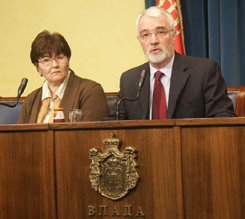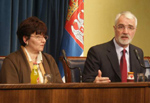- Serbia
Get to know Serbia
- Citizens
Culture and science
Health services
Pension and disability insurance
- Business
Employment
Economy
- Media
- Government
- Contact
Keep in touch
Contact form
Back
Keepin touch
Whether you have a question, comment, suggestion or any problem in the purview of the government, send us your message and we will try to respond as soon as possible. If your problem is not in our purview, we will forward your message to the relevant institution.
Q:
A:
Twin-track approach yields results
Belgrade,
3 December 2004
Serbian Deputy Prime Minister Miroljub Labus said upon his return from an official visit to Brussels, where he spoke to top EU officials, that the “twin-track” approach has started to yield results.
Labus told a press conference that the signing of an agreement on textile will facilitate the development of the domestic textile industry given that free exports to the EU, lower costs, and a trained work force will attract investors.
Labus said that the talks in Brussels also touched on higher quotas for sugar exports to the EU and he added that the quota of 150,000 tonnes a year is not unalterable. Labus added that he received assurances from EU officials that the system of quotas, due to be introduced next year, will not inflict damage to Serbia’s sugar industry.
Labus announced a January meeting of the working group between Belgrade and Brussels, the so-called advanced standing dialogue. He added that one working group from Brussels will visit Belgrade as early as next week, when they will be presented facts about what Serbia has done in the process of association with the EU.
He reiterated that the positive assessment of the feasibility study is expected in the first quarter of 2005 and he added that before that we must receive some kind of an assessment that we are fully cooperating with the Hague tribunal.
Labus said that EU High Representative for Common Foreign and Security Policy Javier Solana had reiterated the EU’s support to Serbia-Montenegro’s joining the EU but that he also warned that EU accession calls for a political consensus within the country.
The visit to Berlin, which came before the visit to Brussels, was described as good by Labus, adding that Serbia should look to increase its presence in the German market given the competition in the region.
Labus pointed out that the Serbian delegation in Berlin met with German investors to discuss possibilities and concrete ways to invest in Serbia. German investors are not very active in Serbia, said Labus, adding that they are deterred by numerous administrative obstacles.
Labus said that the talks in Brussels also touched on higher quotas for sugar exports to the EU and he added that the quota of 150,000 tonnes a year is not unalterable. Labus added that he received assurances from EU officials that the system of quotas, due to be introduced next year, will not inflict damage to Serbia’s sugar industry.
Labus announced a January meeting of the working group between Belgrade and Brussels, the so-called advanced standing dialogue. He added that one working group from Brussels will visit Belgrade as early as next week, when they will be presented facts about what Serbia has done in the process of association with the EU.
He reiterated that the positive assessment of the feasibility study is expected in the first quarter of 2005 and he added that before that we must receive some kind of an assessment that we are fully cooperating with the Hague tribunal.
Labus said that EU High Representative for Common Foreign and Security Policy Javier Solana had reiterated the EU’s support to Serbia-Montenegro’s joining the EU but that he also warned that EU accession calls for a political consensus within the country.
The visit to Berlin, which came before the visit to Brussels, was described as good by Labus, adding that Serbia should look to increase its presence in the German market given the competition in the region.
Labus pointed out that the Serbian delegation in Berlin met with German investors to discuss possibilities and concrete ways to invest in Serbia. German investors are not very active in Serbia, said Labus, adding that they are deterred by numerous administrative obstacles.
-
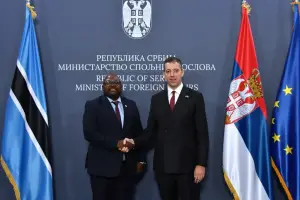 Belgrade, 21 November 2025
Belgrade, 21 November 2025Joint commitment to strengthen bilateral ties between Serbia, Botswana
-
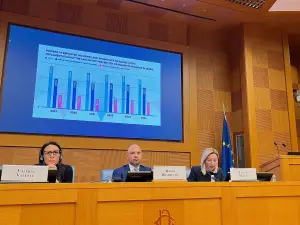 Belgrade/Rome, 21 November 2025
Belgrade/Rome, 21 November 2025Serbian government’s strong commitment to combating violence against women
-
 Belgrade, 18 November 2025
Belgrade, 18 November 2025Serbia remains committed to open dialogue, cooperation with OSCE
-
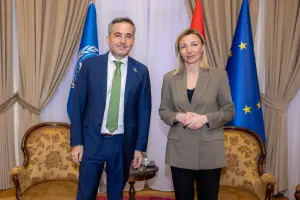 Belgrade, 18 November 2025
Belgrade, 18 November 2025Cooperation with WHO to strengthen protection for victims of violence
-
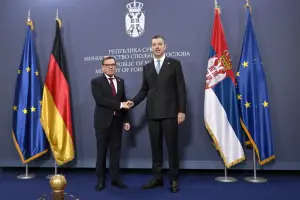 Belgrade, 18 November 2025
Belgrade, 18 November 2025Germany ready to accompany Serbia on its path towards EU
-
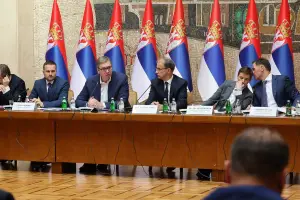 Belgrade, 16 November 2025
Belgrade, 16 November 2025Solution for NIS must be found by next week
-
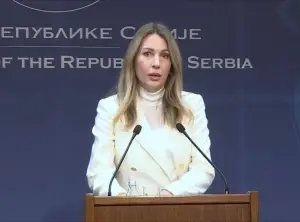 Belgrade, 15 November 2025
Belgrade, 15 November 2025United States sends request for Russian ownership to exit NIS
-
 Belgrade, 13 November 2025
Belgrade, 13 November 2025Serbia continues to be reliable partner of EU
-
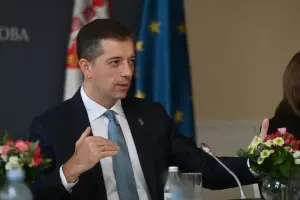 Belgrade, 13 November 2025
Belgrade, 13 November 2025European integration, preserving peace, stability priorities for Serbia
-
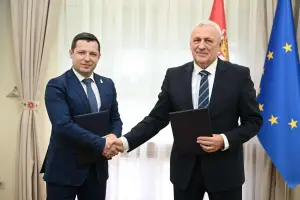 Belgrade, 13 November 2025
Belgrade, 13 November 2025Cooperation agreement signed for preparation of Specialised Expo 2027

